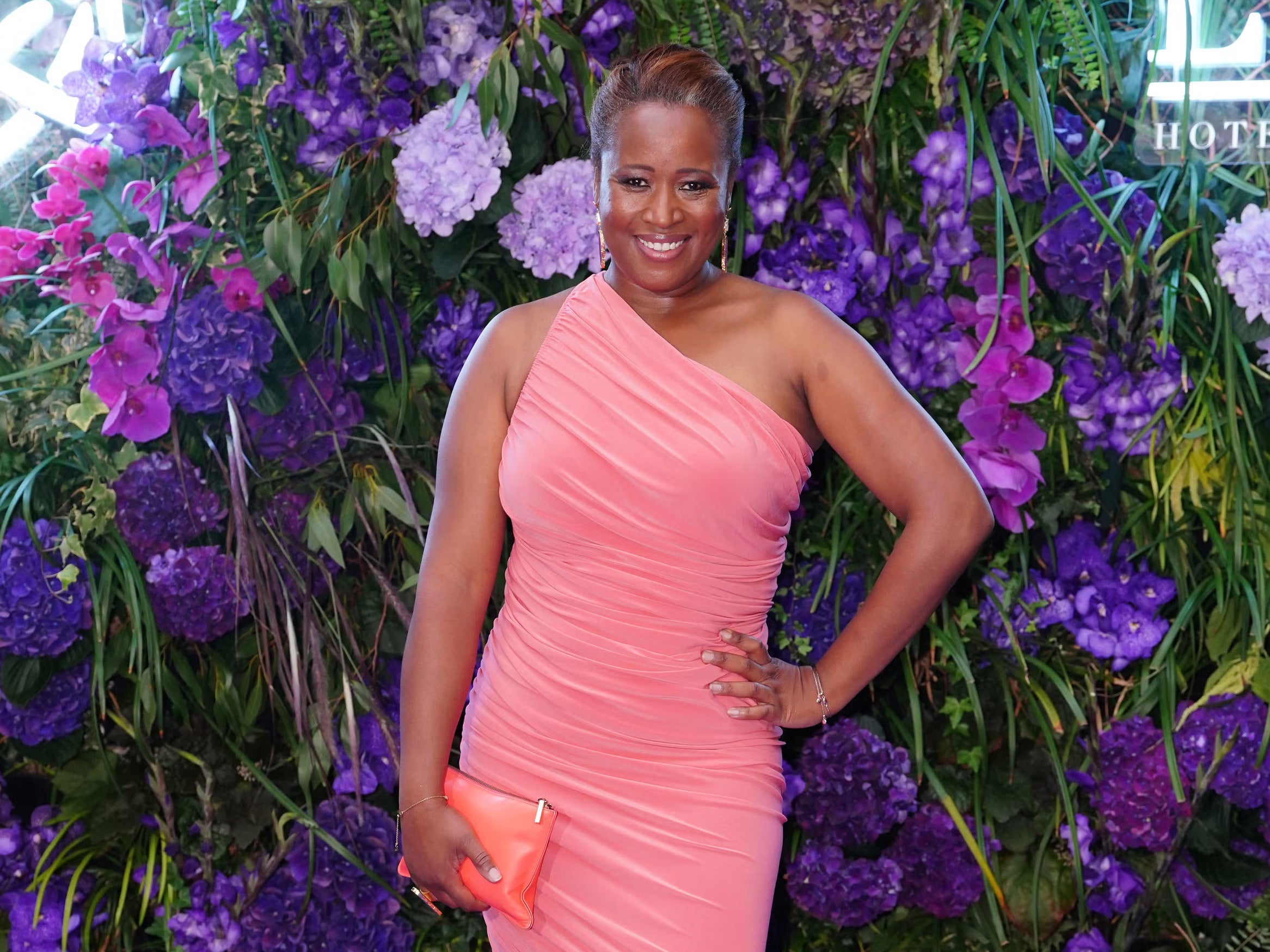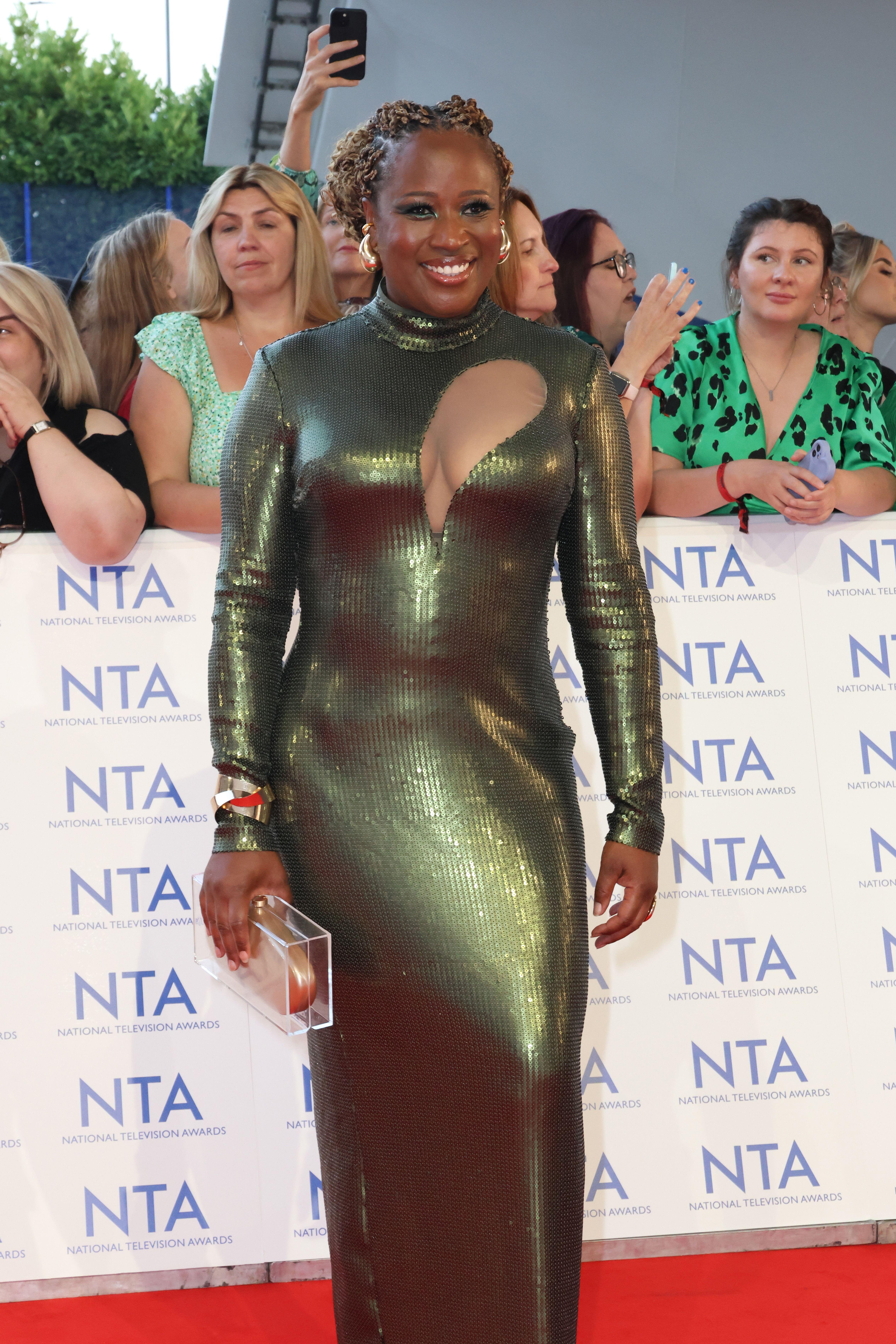Charlene White: ‘I thought about being the first Black female PM’
In a stellar TV news career, broadcaster Charlene White has had to put up with barbed comments about everything from the way she looks to the way she talks. Not feeling you have a “face that fits”, she tells Radhika Sanghani, is why she left the BBC – where she started out – for ITV

Has it really been nine years?” Charlene White shakes her head in disbelief. By accepting the job to present ITV’s flagship News at Ten in 2014 – she didn’t really register that she would become the first Black woman to present the programme. “It’s good that I didn’t know because I was nervous enough anyway. I didn’t think I was capable of that job at that time. I grew up watching Sir Trevor [McDonald] with my parents so it was just iconic for me – it was huge.”
At school, White, now 43, wanted to be a lawyer. She and her two siblings grew up in south London, where her aspirational Jamaican immigrant parents worked five jobs between them to send their children to private school. “My dad was a postman and driving instructor and would leave for work by 5.30am and finish his working day at 10pm,” she remembers. “Mum was a social worker. They worked incredibly hard to put their kids in a different position in life to what they had at a similar age.”
A “boring” spell of work experience at Croydon Crown Court made her rethink her law ambitions and she toyed with the idea of going into politics before settling on journalism. “I knew I wanted to make a mark in the world, and that comes from being a daughter of immigrants,” she says. “I briefly thought about being the first Black female prime minister – then spent more time in parliament and thought, nah. It seemed like a harder battle to fight than doing it this way.”
But journalism has still not been an easy ride for a Black woman from south London who was determined to do things differently. White began her career at the BBC, and recalls her first news bulletin for BBC Look East in Norfolk, where a viewer called in to lodge an official complaint saying: has the BBC run out of white presenters? Why is this woman on my TV when English clearly isn’t even her first language?

“Sometimes your face just doesn’t fit in terms of what someone views as being acceptable for journalism,” says White, in a way that suggests she has dealt with these kinds of experiences more than once. “That’s twofold. As a woman and also as a Black woman. Or my accent.” She references a “pivotal moment” in her time at the BBC where she was asked to change the way she spoke. “I fought against that and refused to change. I made a conscious decision not to change the way I spoke. I drop my Ts sometimes, and use colloquial language, but who cares? I may not speak in RP, but people can understand me so why should I change who I am?”
Aware that she could have been offered other jobs if she had “fallen into a certain mould”, White says refusing to do so isn’t something she now regrets. “One thing I’ve always been mindful of from the start of my career is that I won’t let someone else dictate to me what I’m capable of simply because I’ve got boobs and darker skin. And that’s a vow I made to myself quite early on.”
She still remembers the BBC boss who rejected her for a job she knew she was more than experienced enough for, but the pushback simply spurred her on. “I made it my mission to get an even better job, for them to turn on their TV and realise what it is they’ve lost. I can also hold a grudge for a long time, so I knew I’d never work for that particular person again.” She also has no time for the many agents in the past who would tell her that she was “too difficult to place”. “AKA they didn’t know what to do with a Black woman – I’ve never worked with them again either,” she says pointedly.

Those experiences at the BBC are why she’s now made ITV her home. “I’ll be forever grateful for the grounding I got at BBC Radio 1 and 1Xtra – the only time in my career I’ve worked with a truly diverse team – but it was when we moved into grown-up telly that it became really difficult,” she admits. “I always felt ITV was more me, and that was because of Sir Trevor.” ITV was also the employer of Britain’s first-ever female Black TV reporter, Barbara Blake-Hannah, who was hired by Thames TV in 1968.
Today, White presents ITV News both nationally and for London, is a regular Loose Women presenter, and a newspaper columnist, all while raising two children – Alfie, six, and Florence, four – with her partner Andy. She admits that it’s a lot and it also explains why she’s running on two hours sleep when we meet.
“Becoming a parent myself, I don’t know how my parents juggled so much for so long,” she says. “As a result, I feel like I’m slacking if I’m just doing one job. It’s why I’ve always done more than one, and had a side hustle.”
The incredible work ethic of her parents also means that she’s in a constant state of pressure to succeed. “When you know the sacrifices your parents have made, you can’t let them down and have it be a waste of time and money,” she says. “It makes you very determined. You almost spend a lot of your life still wanting to make them proud.”
Her mother died of bowel cancer when White was just 21, so never got to see the success her daughter achieved as an adult. When White was pregnant for the first time, the grief she felt came back and was so overwhelming that, to deal with it, she went into therapy to navigate all that she was feeling.
“I had to grieve properly for her not being there, but also having to grieve for mothering without having a mother,” she reflects. “It was the best thing I ever did. It meant I was able to go into motherhood having had all those things talked through and laid to rest.”
White has now been with her TV producer partner for nine years after they met in their mid-thirties. They live together in south London, not far from where she was raised, but aren’t married and have no plans to be. “My Loose Women colleagues are obsessed with us getting married,” she laughs. “But I keep saying no because we’re not bothered. I quite like a lovely big wedding but we couldn’t do that and buy a place.” When I suggest a small register office wedding, she looks genuinely shocked. “I couldn’t do that – my family would hate me forever. You go big – or you go home.” Words that White lives by in every way.
When we meet at ITV’s studios in Kings Cross, she’s dressed in a hot-pink dress and has her hair in blonde braids. Facing pressure to look a certain way comes with the territory when you are a woman in broadcasting, but for a Black woman, she says, there has been added pressure too. It just wasn’t always verbalised.
“There’s a certain level of conformity and that means the European aesthetic of beauty, which is straight hair,” she says. “With Black women it was an unspoken thing that if you did this, you’d be more likely to [succeed]. I once had a short bob with balayage and a boss who doesn’t work [at ITV] anymore told me it needed changing because it was too fashionable.
“Those conversations don’t happen with women anymore, because we’re more than capable of figuring out what is smart and acceptable. It has been hard-fought. But you can see now there are few of us that wear suits. We just don’t. We wear what we want to.”
Wearing her hair natural is something she only had the confidence to do after becoming a mother. “I’d just had enough. I’d stopped chemically straightening my hair when pregnant because I didn’t want the chemicals in my body, and I didn’t have time to be sitting in the hairdresser for hours getting my weave done. I needed something less time-consuming.”
She now receives hundreds of messages from women telling her she has inspired them to wear their hair differently in the workplace. She is also contacted by parents who use her as an example in appeals with their children’s schools, to prove that natural hair is smart.
“When you see someone rock up on the biggest news programme in the country with a cute little ’fro, it shows it’s OK to do it”, she says thankful that her appearance is no longer a conversation. But when it comes to diversity she is keen to keep pushing the boundaries and make people rethink their attitudes. It is why she loves working on Loose Women, a show she believes is one of the most diverse in the country. “And that’s not just because we happen to be Black, or because Sophie [Morgan] is [using a] wheelchair ... or because Dame Kelly’s gay. It’s because we’re all good at our jobs anyway.”
But White still knows that whenever all the presenters on the Loose Women rota happen to be Black, they will inevitably receive racist abuse on X/Twitter. “I try to ignore it because [the trolling] comes from jealousy and unhappiness. While I live a life I’m happy with, surrounded by people I love and have a job I enjoy – all things I’m thankful for.”






Join our commenting forum
Join thought-provoking conversations, follow other Independent readers and see their replies
Comments